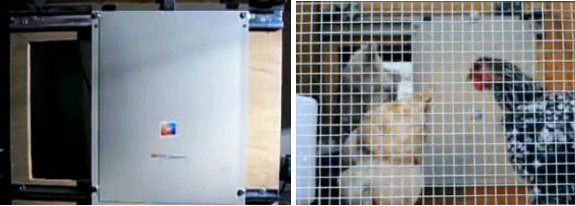
Converting a scanner into an automatic coop door opener

Got an old document scanner
you don't use anymore? Why not give it a new life by converting it into
an automatic chicken coop door opener and closer.
Chicken
sitter.com has some of the details, but be aware this is an advanced
project compared to other
automatic chicken coop door openers. Some
knowledge of Linux will be required to control the scanner.
Makes me wonder if the
scanning arm of an old printer would offer the same results. What I
like about this project is the availability of used scanners out there.
I've seen them in thrift stores in the 10 to 20 dollar range and if you
know someone who has upgraded lately you might find an old free one in
their barn.

Edited to add:
After years of research, Mark eventually settled on this automatic chicken door.
You can see
a summary of the best
chicken door alternatives and why he chose this version here.
If you're planning on
automating your coop, don't forget to pick up one of our chicken waterers. They never spill or
fill with poop, and if done right, can only need filling every few days
or weeks!
Want more in-depth information? Browse through our books.
Or explore more posts by date or by subject.
About us: Anna Hess and Mark Hamilton spent over a decade living self-sufficiently in the mountains of Virginia before moving north to start over from scratch in the foothills of Ohio. They've experimented with permaculture, no-till gardening, trailersteading, home-based microbusinesses and much more, writing about their adventures in both blogs and books.
Want to be notified when new comments are posted on this page? Click on the RSS button after you add a comment to subscribe to the comment feed, or simply check the box beside "email replies to me" while writing your comment.

I wonder how long the relatively fragile electronics of a scanner will last in the semi-protected environment of a chicken coop. I'd think that chicken manure will contain (precursors of) corrosive chemicals. The mechanism of a scanner is definitely not constructed with this use in mind.
The difficult bit is usually to take all the corner cases into account; e.g. if some straw gets stuck in the door and prevents it from closing. A simple program will power the motor until the closing switch trips, which in the aforementioned case would probably burn out the motor.
Using electronics in an extremely flammable environment like a chicken coop is something else to think about. One spark could be sufficient to burn the whole coop down.
And of course you'd want to construct the door in such a way that it would be impossible for a predator to pry open.
(BTW, cycling computers usually contain magnetic reed switches. Usually, the magnet is clipped to a spoke and the magnetic switch is placed on a leg of the front fork and connected to the cycling computer mount with a wire)
The delicacy of the scanner is an excellent point. And that's also a great point about how the real world setting of a chicken coop poses problems that the engineer might not consider.
I love the simplicity of your solution!! If we were going to build a coop door opener/closer, I think I'd definitely vote for that answer.
Part of the job of an engineer is to think of everything that pertains to solving the problem at hand. Of course we do not always succeed. But we do try and learn from our mistakes (see FMEA).
But we do try and learn from our mistakes (see FMEA).
But the method for solving problems is in principle not difficult. It basically amounts to using logic and common sense, combined with a knowledge of the physical laws of nature;